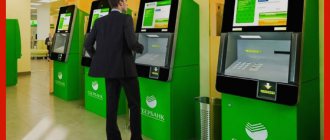There is no doubt that the amount of compensation for travel expenses should be taken into account in the expenses accepted for the purpose of calculating income tax. This is directly stated in subparagraph 12 of paragraph 1 of Article 264 of the Tax Code of the Russian Federation, which classifies them among other expenses. However, taxpayers have questions about this category of expenses in cases where they are paid not in cash, but using bank cards. The commented letter is another explanation from officials on this situation.
Is it possible to issue a report to an employee’s card?
The legislation of the Russian Federation does not have a separate regulatory document establishing the procedure for issuing accountable funds to an employee’s card. The Bank of Russia directive “On the procedure for conducting cash transactions for legal entities and individual entrepreneurs” dated March 11, 2014 No. 3210-U, known to accountants, regulates the issuance of sub-reports only in cash.
But based on the regulation of the Central Bank of the Russian Federation “On the issue of payment cards” dated December 24, 2004 No. 266-P, we can conclude: organizations and individual entrepreneurs have the right to pay their expenses through a card issued to an individual authorized by them (clauses 1.5, 2.5). This position is confirmed by official explanations of the Ministry of Finance of the Russian Federation:
- letter dated July 21, 2017 No. 09-01-07/46781;
- letter dated August 25, 2014 No. 03-11-11/42288;
- letter dated October 5, 2012 No. 14-03-03/728.
Central Bank Regulation No. 266-P dated December 24, 2004 also provides a list of expenses that organizations and individual entrepreneurs are allowed to pay through the card of an authorized individual (see clause 2.5):
- payment of expenses related to the activities of the organization (IP) on the territory of the Russian Federation;
- payment of travel and entertainment expenses on the territory of the Russian Federation and abroad;
- carrying out other operations not prohibited by the legislation of the Russian Federation.
How to use cash register systems when making payments through accountable persons? Find out the expert opinion at ConsultantPlus by getting trial access for free.
See also “Errors made in accounting for settlements with accountable persons.”
Can “travel” amounts be transferred to an employee’s card?
Officials changed their minds and now do not object to the transfer of accountable amounts to employees’ salary cards (letter of the Treasury of the Russian Federation dated July 26, 2011 No. 42-7.4-05/5.2-500).
How to issue an advance for a business trip To begin with, we note that the ability to transfer travel expenses to employees’ plastic payment cards must be stipulated by the terms of the agreement concluded with the bank.
Cash advance preferred
Despite the obvious advantages of non-cash payments, credit institutions do not always meet customers halfway. In this case, banks refer to the explanation of the Bank of Russia, convenient for them, contained in letter dated December 18, 2006 No. 36-3/2408. In their opinion, bank card holders can be both individuals and legal entities. Among the operations carried out by legal entities using payment (debit) and credit cards, payment of travel expenses in the territory of the Russian Federation is mentioned (clause 2.5 of the Regulations approved by the Central Bank of the Russian Federation dated December 24, 2004 No. 266-P). However, this document does not provide for such operations for individuals. An additional argument for refusing to include in the agreement with the bank a provision that travel amounts can be transferred to salary cards is the norms of paragraphs 10, 11 of the Procedure for conducting cash transactions in the Russian Federation (approved by decision of the Board of Directors of the Bank of Russia dated September 22, 1993 No. 40). From an analysis of these provisions, bank employees conclude that employees are paid money in cash upon reporting. However, this is far from certain.
Cashless advance is also possible
The circulation of bank cards is regulated by the Regulations on the issuance of bank cards and on transactions performed using payment cards, approved by the Central Bank of the Russian Federation dated December 24, 2004 No. 266-P. Thus, according to clause 2.3 of the specified document, restrictions on the list of transactions performed by individuals using bank cards are associated with the presence of restrictions provided for by the legislation of the Russian Federation. At the same time, the procedure and amount of reimbursement of expenses associated with business trips are determined by a collective agreement or local act. The basis is Article 168 of the Labor Code of the Russian Federation. It turns out that the institution has the right to transfer accountable amounts to the employee’s salary card only if such a payment procedure is provided for by a collective agreement or other local act. Thus, based on the above, we can say that an institution, when sending an employee on a business trip, can still issue funds to the account, transferring them to the employee’s salary card. The employee, in turn, can pay by card or cash (having previously withdrawn money from the cash register). In addition, the Federal Treasury issued a letter in which it finally agreed that officials of their department have no legal grounds for refusing to allow institutions to transfer travel allowances to employees’ salary cards. And they confirmed this in a letter dated July 26, 2011 No. 42-7.4-05/5.2-500. If you are guided by this letter, you should remember the following. According to Article 167 of the Labor Code of the Russian Federation, when an employee is sent on a business trip, he is guaranteed reimbursement of related expenses. The list of such expenses is open. However, they must be carried out with the permission or knowledge of the employer (Part 1 of Article 168 of the Labor Code of the Russian Federation, Clause 11 of Regulation No. 749). The procedure and amount of reimbursement of expenses associated with business trips are determined by a collective agreement or local regulations (part 2 of article 168 of the Labor Code of the Russian Federation, clauses 11 and 24 of Regulation No. 749).
Consequently, the collective agreement (local regulatory act) of a budgetary institution should determine not only the norms for reimbursement of travel expenses, but also the additional costs associated with paying travel expenses from a bank card (bank commission). This is due to the fact that if an institution transfers funds to a posted employee to his personal bank card account for upcoming travel expenses, then when making payments using a bank card, as well as when the employee withdraws the necessary amounts in cash, a bank commission is charged.
The employee must report on the amounts spent
Upon completion of the business trip, the employee is obliged to submit to the employer within three working days: – An advance report on the amounts spent (f. 0504049) and make the final payment for the cash advance issued to him before departure; – Report on work performed on a business trip (f. 0301025), agreed upon with the head of the employer’s structural unit, in writing. Attached to the advance report is a duly executed travel certificate, as well as documents on actual travel expenses (including an insurance premium for compulsory personal insurance of passengers on transport, payment for services for issuing travel documents and providing bedding on trains). According to clause 3.1 of Regulation No. 266-P, transactions using bank cards require the compilation of documents on paper (slip, receipt of an electronic terminal) and (or) in electronic form (a document from the electronic log of a terminal or ATM), as well as other documents ( ATM receipt, etc.) provided for by banking rules and (or) agreements concluded between settlement participants. A document on transactions using a payment card is the basis for making settlements for these transactions and (or) serves as confirmation of their completion. Thus, in addition to those documents that are usually attached to the advance report on travel expenses, it is also necessary to submit the originals of slips, receipts of electronic terminals/ATMs for all transactions made using a bank card.
The procedure for reflecting the situation in accounting
We will consider the rules for reflecting in accounting the operation of issuing accountable amounts to an employee using a salary card using an example.
Example.
An employee of a budgetary institution (who has not switched to subsidies) has travel allowances transferred to his bank card based on: – expenses for renting a living space – 2,200 rubles; – travel expenses to the place of business trip and back – 3,000 rubles; – daily allowance – 400 rub. After returning from a business trip, the employee drew up an advance report. Costs, according to the approved advance report, amounted to: – for renting residential premises – 2000 rubles; – for travel to the place of business trip and back – 3000 rubles; – daily allowance – 400 rub. The advance report was approved by the head of the institution's structural unit, after which the employee submitted the report to the accounting department. The remaining amount for renting residential premises is 200 rubles. (400 – 200) was deposited into the institution’s account independently by the employee through an ATM in cash.
>|Budget institutions that have not changed the type as part of the budget reform keep records in accordance with the Instructions for using the chart of accounts for budget accounting (the same as government institutions).|< The accountant of the institution made the following entries:
| Contents of operation | Debit | Credit | Amount, rub. |
| The amount of daily allowance is transferred to the report | 1 208 12 560 “Increase in accounts receivable of accountable persons for other payments” | 1 304 05 212 “Settlements for payments from the budget with financial authorities for other payments” | 400 |
| The amount for payment of transport services is transferred to the report | 1 208 22 560 “Increase in accounts receivable of accountable persons for payment for transport services” | 1 304 05 222 “Calculations for payments from the budget with financial authorities for transport services” | 3000 |
| The amount to pay for the rental of residential premises has been transferred to the report. | 1 208 26 560 “Increase in accounts receivable of accountable persons for payment for other works and services” | 1 304 05 226 “Settlements for payments from the budget with financial authorities for other works and services” | 2200 |
| The expenses incurred by the accountable person for the payment of daily allowances have been accepted for budget accounting | 1 401 20 212 “Expenses for other payments” | 1 208 12 660 “Reduction of accounts receivable of accountable persons for other payments” | 400 |
| Expenses incurred by the accountable person to pay for transport services have been accepted for budget accounting | 1 401 20 222 "Expenses for transport services" | 1 208 22 660 “Reducing accounts receivable from accountable persons for payment for transport services” | 3000 |
| The expenses incurred by the accountable person to pay for the rental of residential premises have been accepted for budget accounting | 1 401 20 226 “Expenses for other work, services” | 1 208 26 660 “Reducing accounts receivable from accountable persons for payment for other works and services” | 2000 |
| The balances of accountable amounts for payment of rent of residential premises have been returned | 1 304 05 226 “Settlements for payments from the budget with financial authorities for other works and services” | 1 208 26 660 “Reducing accounts receivable from accountable persons for payment for other works and services” | 200 |
The article was published in the journal “Accounting in Budgetary Institutions” No. 11, November 2011.
The procedure for issuing funds for reporting
Funds under the report are transferred either for business and operating expenses or for expenses associated with business trips.
The list of employees who have the right to receive funds on account is established by the Company Order.
Funds are transferred on account regardless of whether the accountable person is indebted for previous accountable amounts.
Individuals who have signed a civil contract with JSC Buttercup to perform work or provide services during the validity period of this agreement also have the right to receive funds on account from the cash desk of JSC Buttercup.
Starting point – Labor Code of the Russian Federation
The Labor Code of the Russian Federation (hereinafter referred to as the Labor Code of the Russian Federation) regulates not only issues of remuneration, but also the procedure for reimbursing employees for expenses in connection with business trips. Article 168 of the Labor Code of the Russian Federation states that if sent on a business trip, the employer is obliged to reimburse the employee for expenses incurred by the employee with the permission or knowledge of the employer. In addition, in pursuance of this article of the Labor Code of the Russian Federation, by Decree of the Government of the Russian Federation dated October 13, 2008 No. 749, the Regulations on the specifics of sending employees on business trips were approved, according to paragraph 11 of which employees are reimbursed for travel expenses and rental of living quarters, additional expenses associated with accommodation outside the permanent place of residence (daily allowance), as well as other expenses incurred by the employee with the permission of the head of the organization. From the above, financiers conclude that the employer is obliged, in accordance with the established procedure, to reimburse the expenses incurred by the employee related to the business trip.
Typical mistakes when making payments to accountable persons
It is also worth understanding in as much detail as possible the procedure for returning unused amounts. Return of unused accountable amounts The legislation does not directly indicate the period during which the employee is obliged to return unspent funds. But it must be indicated in special reporting documentation. Most employers indicate a period of 3 days. If for some reason the employee was unable to return the money on time, then the tax authorities will be required to charge additional personal income tax as for wages. Refunds can be made in two ways:
- to the cash desk of the enterprise;
- by bank transfer.
The very fact of transferring unused funds must be indicated in the payment order or in a special explanatory note. This requirement must be strictly observed.
What changed
From June 1, 2021, everyone who pays individuals will have two new responsibilities when transferring and completing payments.
The amount of collection in the purpose of payment. If your employee is a debtor, and you, as an employer, have received a writ of execution for deduction from his wages, you must make a note about this on the payment slip. In the “Purpose of payment” field, indicate the amount of the collected amount in the following format: symbol “//”, “VZS” (amount collected), symbol “//”, amount in numbers, symbol “//” .
An employee paid for services using his bank card: how to report
Using, for example, a rental car or ordering the transportation of furniture from an office to a warehouse, and acting in the interests of the company, the employee paid for the services with his credit card, how to report to the accounting department in order to receive a refund? The service is no different in terms of the reimbursement algorithm in this case from the product. The employee only needs to submit an application for reimbursement of expenses to the financial department or accounting department and attach to it all checks and receipts confirming payments. The requirement for providing a report on spent funds is the timeliness of reporting. The law defines a period of three days after the employee makes a payment or arrives from a business trip and returns to work. If the deadline for submitting supporting documentation to the organization's accounting department is violated, the expenses are recognized by the manager as unfounded, and the employee will be denied reimbursement of expenses, and if the amount was issued earlier for reporting, it will be deducted from the employee's salary. Tax and accounting services do not differ from product accounting.
Read more widely
Reading the letter literally, you can notice that when describing the situation, the financiers are not talking about payment by the card of a posted person, but about payment by a card of a person authorized by the bank (we read: the taxpayer is the employer who sent the employee). In this case, we can assume that we are talking about the fact that the expenses for travel and hotel reservations were not made by the employee going on a business trip, but by another person specially authorized for this by the employer (for example, an employee of the economic management or human resources department). In this case, the qualification of the expenses themselves for tax purposes as travel expenses does not change in any way. Only the person who actually carried them out (paid for them) changes. Such an authorized person, having paid the upcoming travel expenses of another employee of the organization, from his personal card account has the full right to receive reimbursement from the employer on an independent advance report, attaching to it documents confirming the reservation and payment of travel and the originals of all documents related to the use of his bank card. The business traveler himself will receive from the organization originals (copies) of already paid travel and hotel documents. Upon his return, he will attach them to his expense report. Naturally, he will no longer be able to claim their reimbursement, since they were already paid earlier, but his advance report will allow the employer to legally take such costs into account as part of travel expenses.
Auditor S.M. Ryumin
, for the magazine “Regulatory Acts for Accountants”
Help your business grow
Invaluable experience in solving current problems, answers to complex questions, specially selected latest information in the press for accountants and managers. Choose from our catalog >>
If you have a question, ask it here >>
How can I spend proceeds on my personal account?
Having received accountable money into his bank card account, the accountable person can pay for expenses incurred either directly from her account or in cash. Funds in a personal account are not segregated in any way, they are not subject to the rules of special accounts - an individual has the right to dispose of them at his own discretion: cash out or pay by bank transfer.
This is logical, since receiving money for reporting obliges an individual to spend this amount in accordance with the purposes for which they were received, account for them and, if necessary, return the unused amount to the employer within a specified period. Everything is the same as when issuing cash, there are no new requirements for spending bank transfers.
Considering that all receipts to an individual’s account formally become his property, it is better to inquire in advance about open enforcement proceedings against the accountable, since all receipts in this case will be written off to pay debts. This, of course, will not relieve him of the obligation to account for the expenditure of accountable amounts.
Tax Code of the Russian Federation - the main thing is the fact of payment by an authorized person
As we have already noted, for profit tax purposes, expenses for business trips of the organization’s employees, on the basis of subparagraph 12 of paragraph 1 of Article 264 of the Tax Code of the Russian Federation, are taken into account as part of other expenses. However, these expenses, like all others, must meet the criteria of paragraph 1 of Article 252 of the Tax Code of the Russian Federation. In particular, they must be economically justified, supported by documents drawn up in accordance with the legislation of the Russian Federation, and produced to carry out activities aimed at generating income.
The Tax Code of the Russian Federation does not directly say how to document travel expenses in the situation we are considering. Therefore, financiers, when considering this specific issue, proceed from the general principles of documentary evidence of expenses. In particular, they indicate that documentary evidence of travel expenses for profit tax purposes will be the employee’s advance report with duly executed supporting documents attached to it, in particular, air or train tickets, a hotel bill, etc. In addition, it should be clear from the attached documents that the costs of travel, accommodation, etc. it was the posted worker who suffered. This is one of the conditions for the employer to reimburse travel expenses to an employee of the organization. If such expenses are incurred by a posted employee using his personal bank card, then in this case the advance report must be accompanied by the originals of all documents related to the use of the authorized employee’s bank card, ATM receipts, slips (electronic terminal receipt), etc., in which The surname of the bank card holder must be indicated.
…documentary evidence of travel expenses for profit tax purposes will be the employee’s advance report with duly executed supporting documents attached to it, in particular, air or train tickets, a hotel bill, etc.
As a result, the Ministry of Finance of Russia makes a completely logical conclusion that if payment for travel documents (tickets) and hotel reservations for a posted worker are made from the bank card of a person authorized by the bank ( read: the posted worker
) and this is confirmed by the primary documents attached to the advance report (tickets and hotel invoice), then there is no reason to believe that the expenses were not incurred by the business traveler. Therefore, financiers do not object to taking these expenses into account for profit tax purposes, subject to the criteria established by paragraph 1 of Article 252 of the Tax Code of the Russian Federation.
Accounting entries for advance reports
| Wiring | Decoding |
| Dt 71 Kt51 | 71 accounts – settlements with accountable persons 51 – current account The operation indicates the transfer of funds from a current account to an individual |
| Dt 26 Kt71 | 26 accounts - general business expenses Reflected expenses on the advance report |
| Dt 71 Kt50(51) | If there is an overrun |
| Dt 50 Kt71 | Cash returned to the cash register |
| Dt 51 Kt71 | The employee transferred the surplus to the organization's current account |
| Dt 70 Kt 71 | The amount is withheld from the employee’s salary to account for the advance report |
3:
, .
. (N-1), 01.08.2001 N 55.
, , .
( 3).
3
| , . . | |
| : | |
| . 1. | |
| 1. () | |
| 54 000,00 |
| 54 000,00 | |
| 54 000,00 |
.
“” (e.zarp.ru) “” (2014, No. 5).
-, – , , , .
-, .
-, , .
..
What should I indicate in the purpose of payment when issuing a report to an employee’s card?
When transferring accountable money to an employee’s card, in field (24) of the payment order, indicate its purpose as clearly as possible. Then, when receiving tax requests, it will be easier to find all supporting documents (applications, orders, advance reports). Eg:
“Issuance on account for the purchase of travel tickets according to application dated 10/26/20XX No. 124.”
All other details are filled in as usual.
For rules and a sample of filling out payment orders, see this article.
How to transfer money - transfer procedure
A number of actions to be able to transfer travel funds to a salary card:
- Regulatory acts regulating business trips and payments for them are drawn up.
- Each employee must familiarize himself with the acts upon signature.
- Before going on a business trip, the employee writes a statement indicating the data: consent to transfer funds to the card;
- consent to control the status of the account.
The order must contain the required information:
- Company name;
- Full name, position and structural unit of the seconded employee;
- business trip period;
- date of issue of the order;
- manager's signature;
- visa to familiarize yourself with the order of the employee himself.
After issuing the order and familiarizing the employee with it, the organization transfers the required travel allowances.
They must be paid before departure on a business trip. However, there is not always enough money, then compensation for overspent funds is transferred by payment order.
Based on a special provision, the employee’s card receives daily allowance, compensation for travel expenses and rental housing.
Important! A prerequisite is that the payment purpose field of the payment order must contain the phrase “travel needs.”
Purpose of payment in the payment order
To correctly fill out a payment order for transferring amounts for a business trip, you need to follow the following algorithm of actions:
- have details of the account to which funds will be transferred in order to control the sending of money to the required details;
- the purpose of the payment must be stated as “accountable amounts for travel expenses”
It is the correct display of the payment purpose that will protect the company from claims during inspections.
The purpose of payment can be formulated in different ways. The main thing is that there is a phrase about accountability.
Example 1
“Transfer of funds against the report to the bank account of employee Kuzin A.A. according to order dated January 25, 2019 No. 20. Without VAT"
Example 2
“Compensation for overexpenditure of travel expenses to employee P.P. Petrov according to the advance report dated February 26, 2019 No. 45. Without VAT"
Filling example
Errors and clerical errors in the document are unacceptable. It is recommended to fill out the payment order correctly. If mistakes are made, the bank may cancel or simply not process the transfer.
Also, an incorrectly drawn up payment invoice is grounds for the imposition of a penalty by tax authorities.
Important! The correct designation of the purpose of the payment will be convincing evidence that the transferred funds do not relate to the employee’s income.
Problems with blocking a bank card
Recently, there have been legal proceedings related to the blocking of a bank card to which accountable money is transferred.
Blocking a card is a procedure of technical restriction on transactions using it, providing for the bank’s refusal to provide authorization (obtaining from the bank the permission necessary to use the card transaction, and obliging the bank to execute the order of its holder), that is, limiting the remote ability to manage the account.
This is due to the fact that the bank is obliged to document information obtained as a result of implementing internal control rules in order to combat the legalization (laundering) of proceeds from crime and the financing of terrorism in cases where unusual transactions are detected.
For this reason, the bank has the right to request, and clients are obliged to provide the bank with the necessary information (clause 14 of article 7 of the Law of 07.08.2011 No. 115-FZ “On combating the legalization (laundering) of proceeds from crime and the financing of terrorism" , clause 4.1 of the Regulations on the requirements for the internal control rules of a credit organization in order to combat the legalization (laundering) of proceeds from crime and the financing of terrorism, approved by the Bank of the Russian Federation dated March 2, 2012 No. 375-P).
Important! At the same time, the current legislation in the field of combating the legalization (laundering) of proceeds from crime and the financing of terrorism does not limit credit institutions in terms of the volume of documents requested from clients.
In turn, clients are obliged to provide organizations carrying out transactions with funds or other property with the information necessary for these organizations to fulfill the requirements of this federal law, including information about their beneficiaries and beneficial owners (clause 14 of article 7 of Law No. 115-FZ ).
For example, in one of the court cases reviewed, in the period from November 2021 to January 2021, large sums of money were regularly credited to an individual’s bank card account. Transfers were made in equal amounts, with the purpose of payment “On account for business needs.” The total amount of funds transferred to the account was: 2 payments of 250 thousand rubles, 17 payments of 100 thousand rubles.
The bank requested clarification on the transactions for depositing funds, as well as documents confirming the economic meaning of the transactions performed.
In response to the Bank’s request, the client provided the following documents: an employment order for the position of chief accountant, an employment contract, receipts for cash receipts with the purpose of “return from an accountable person.” No other documents confirming the posting of funds to the organization's cash desk were presented. No explanations were provided about the reasons for the multiple returns to the company's cash desk of funds received on account.
From an analysis of the documents provided by the Bank, it was concluded that the client’s transactions did not have clear economic meaning. The information and documents provided did not allow us to exclude suspicions about the dubious nature of the transactions carried out by the client. Taking into account all the information available to the Bank, a decision was made to recognize the client’s transactions as suspicious.
Subsequently, at the court hearing, the employee confirmed that she used these funds in cash to pay contractors under business contracts. If the counterparty could not accept payment, she handed over the money to the cashier, but did this only for the bank, holding it for some time.
The court recognized the actions of Sberbank PJSC as legal (Decision of the Budennovsky City Court (Stavropol Territory) dated 06/07/2018 No. 2-563/2018).
But if you submit all documents to the bank in a timely manner and explain the essence of the transactions, then there will be no grounds for blocking the card. As noted in the Determination of the Moscow City Court dated 09/07/2016 No. 4g-10455/2016 “... an individual is not engaged in entrepreneurial activity and the transfer of funds to his personal card cannot be considered entrepreneurial activity, as well as arguments about the absence of a ban on the transfer organization of accountable amounts to the personal cards of employees, since they are based on an incorrect interpretation of substantive law and are not supported by evidence.”
Transfer of travel allowances to the employee’s “salary” card
(Letter of the Treasury of the Russian Federation dated July 26, 2011 No. 42-7.4-05/5.2-500)
The legislation does not contain a ban
to issue money to an employee for business expenses
in non-cash form
.
In letter dated December 18, 2006 No. 36-3/2408, the Central Bank of the Russian Federation noted that Bank of Russia Regulation No. 14-P dated January 5, 1998 “On the rules for organizing cash circulation on the territory of the Russian Federation” does not provide
the exercise by banking institutions
of control over non-cash payments made by organizations
, in particular, transactions of non-cash transfer of funds from the organization to the bank accounts of their employees, opened by them to carry out
transactions with bank cards
.
However, the Central Bank further reported that Bank of Russia regulations do not provide for the issuance of funds by an organization on account of its employees by non-cash transfer
funds to their bank accounts to carry out transactions related to the economic activities of the organization.
According to paragraphs 10, 11 of the Procedure for conducting cash transactions in the Russian Federation, approved by the Decision of the Board of Directors of the Bank of Russia dated September 22, 1993 No. 40, the Central Bank believes that the issuance of cash by organizations on account
to its employees to make these expenses
in
cash.
The editors, who previously considered this issue, noted that the Central Bank of the Russian Federation somewhat arbitrarily quoted the norm of clause 10 of the Procedure for Conducting Cash Transactions...
Paragraph 10 says (we quote)
:
cash issuance
on account is made from the cash registers of enterprises
(end of quote)
.
That is, in paragraph 10 it is emphasized that cash
for reporting should be issued
from the cash registers of enterprises
.
And nowhere in the text of the Order... is it indicated
that money can only be issued in cash on account.
Courts
They also do not find anything illegal in transferring accountable amounts to employees’ bank cards.
The possibility of transferring funds against a report to the bank card of an accountable person must be established by a local regulatory act of the enterprise, in particular, by order of the head of the enterprise
.
In the resolution of February 11, 2008 No. A52-174/2007 of the Federal Antimonopoly Service of the North-Western District
considered it justified to transfer accountable amounts to the employee’s bank card
if the following conditions are met
:
– by order of the director of the organization
It is allowed, in connection with production needs, to issue funds to employees of the enterprise for business needs from the enterprise's cash desk, from a current account to the bank card of an accountable person, or in cash;
– payment orders
on transfers of funds to the employee’s account, in which there is no indication of the transfer of these funds as wages;
– presence of an advance report
;
– invoices for the purchase of materials and goods, cash register receipts, receipts for receipt orders issued by the seller are presented.
The Federal Treasury considered the issue of transferring travel expenses to bank cards of individuals - employees of organizations whose personal accounts are opened in the territorial bodies of the Federal Treasury, and reported the following.
Regarding the transfer of travel expenses to bank accounts of individuals opened for transactions using settlement (debit) bank cards (“salary” cards), it should be noted that, according to Art. 168 Labor Code of the Russian Federation
the procedure and amount of reimbursement of expenses related to business trips are determined by a collective agreement or local regulations.
Thus, the question of the admissibility of transfer (reimbursement) of funds for travel expenses to the bank accounts of employees - individuals
, open for transactions using settlement (debit) bank cards (“salary” cards),
is in the scope of application of labor legislation and does not fall within the competence of the Bank of Russia
, defined by the Federal Law of the Russian Federation “On the Central Bank of the Russian Federation (Bank of Russia)”.
In this regard, the Federal Treasury believes that the Federal Treasury authorities have no legal grounds for refusing to allow organizations to transfer travel expenses to the bank accounts of their employees
(individuals) open for transactions using settlement (debit) bank cards (“salary” cards).
The editors believe that these conclusions also apply to commercial organizations whose accounts are opened in commercial banks
.
An employee who has received money in non-cash form to perform an official task must formalize
advance report
in form No. AO-1
, and the accountant should reflect settlements with such an employee using account 71.
After all, having received money to perform an official task, an employee cannot spend it as he pleases, he must spend it only for the purposes designated by the organization, and must report
about what he spent the money on.
The Instructions for the use of the “Advance report” form say that this form is used to account for funds issued to accountable persons
for administrative and business expenses.
However, it was not specified in what form the money was given to the employee.
In addition, Art. 272 Tax Code of the Russian Federation
it is stipulated that some expenses (
travel
, entertainment) are recognized on the date of approval
of the advance report
.
Thus, the “accountable”
, who received money in non-cash form, should
draw up an advance report
.
Regarding count 71
“Settlements with accountable persons”, it is intended to summarize information on settlements with employees
for the amounts issued to them on account
for administrative, business and other expenses.
For the amounts issued for reporting, account 71 “Settlements with accountable persons” is debited in correspondence with the cash
(and not just with a score of 50 “Cashier”).
As you can see, the Instructions for using the Chart of Accounts... speaks of the use of account 71 when issuing amounts to employees for reporting
, without specifying
the form
of payment (cash or non-cash).
Thus, settlements with employees who received money to complete an official task in non-cash form are quite correct
reflect on account 71.
At the same time, according to clause 3.3 of the Regulations on the issuance of bank cards and on transactions performed using payment cards
, approved by the Central Bank of the Russian Federation on December 24, 2004 No. 266-P,
the document on transactions using a payment card must contain the following mandatory details
:
identifier of an ATM, electronic terminal or other technical means intended for performing transactions using payment cards; type of operation; transaction date; transaction amount; transaction currency; commission amount (if any); authorization code; payment card details.
Postings for transferring funds to the employee’s card in the report
The issuance of accountable funds to the employee’s card in accounting is recorded by the following posting:
Dt 71 Kt 51 (52).
When returning unused accountable funds in cash through the cash register, the following entry is made:
Dt 50 Kt 71.
When transferring an unused sub-report by non-cash method - from an employee’s card to the company’s bank account - the following entry is made:
Dt 51 (52) Kt 71.
Find out about the nuances of accounting for settlements with accountable persons in ConsultantPlus. If you don't already have access to the system, get a free trial online.







